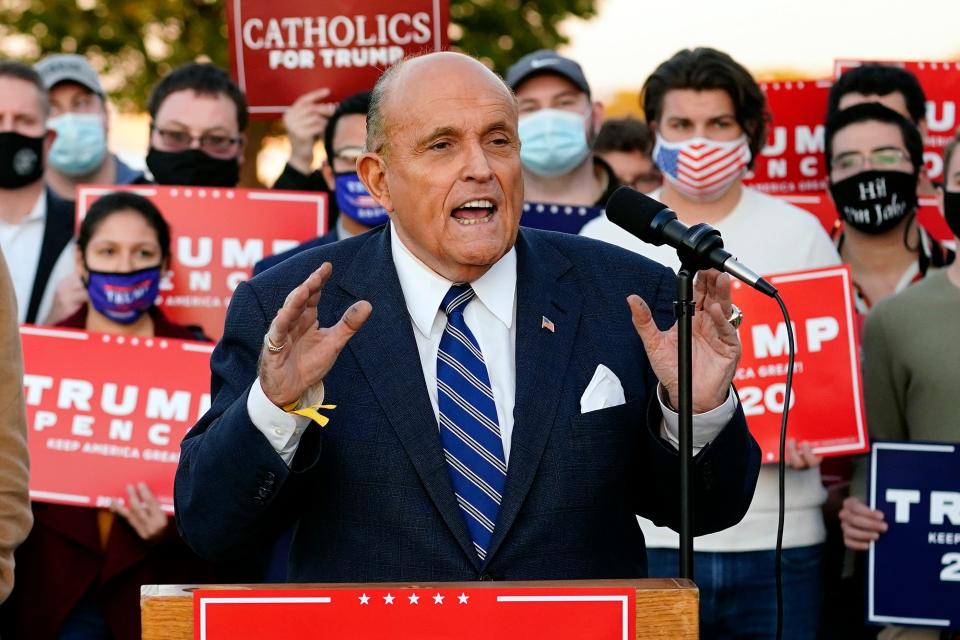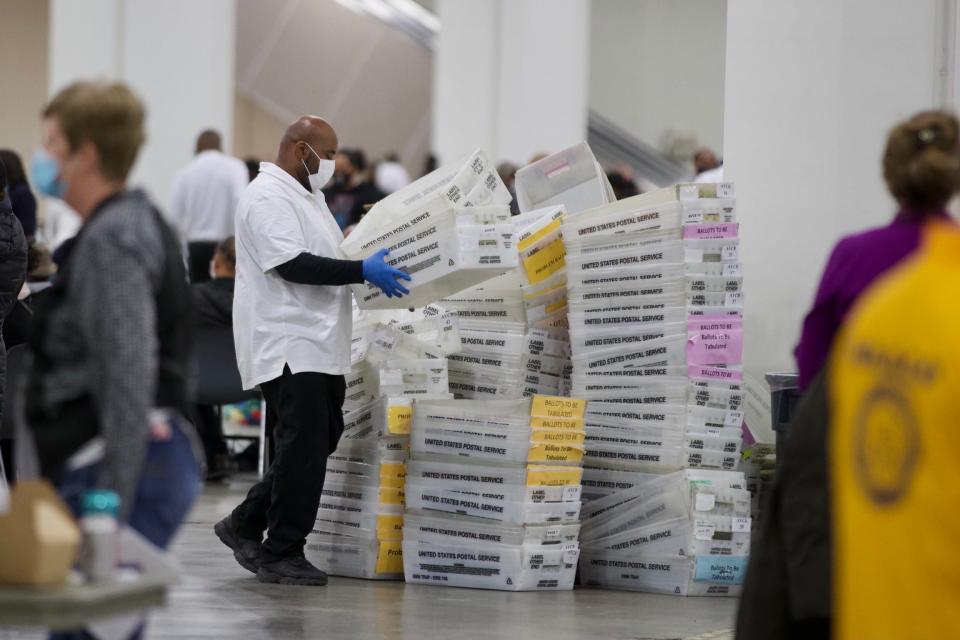'Damaging to our democracy': Trump election lawsuits targeted areas with large Black, Latino populations
WASHINGTON – In courtrooms across the country, judges have issued one withering rebuke after another, rejecting President Donald Trump's campaign's efforts to invalidate millions of votes and cast doubt on the election he lost.
By Monday, all swing states had certified Democrat Joe Biden's victory, even as the president and his allies continued to challenge the results.
To many, the series of events proved that the election system survived an unprecedented challenge. Yet some fear the damage to democracy has been done, particularly to communities of color.
Trump and his allies have spent weeks telling the public that massive voter fraud and irregularities occurred in big cities and counties with large populations of Black and Latino voters. These sweeping allegations raised concerns among voting rights experts that the president is perpetuating a harmful perception: that voters of color are the culprit in an unfounded – but widely believed – conspiracy to rig the election, and their votes should be invalidated.
Trump's effort to blame cities, such as Detroit and Philadelphia, ignores a critical point: Suburbs and exurbs in swing states propelled Biden to victory – not urban centers, where Trump won more votes than he did four years ago.

"Make no mistake, I see loud and clear that the lawsuits are based primarily in communities of color, particularly African American communities," said Justin Levitt, a former Justice Department official whose work focused on voting rights. "It sure seems like an attempt to teach millions of Americans that there's a particular group to blame for what people feel – wrongly, incorrectly, without any factual support whatsoever."
How suburbs cost Trump the election: Trump baselessly claims voter fraud in cities, but suburbs actually lost him the election
Trump targets counties with large Black and Latino populations
In Michigan, the Trump campaign's legal challenges focused on Wayne County, specifically on alleged anomalies at an election center in Detroit, where nearly 80% of the population is Black. No such anomalies were alleged in predominantly white suburban counties where Biden won by large margins.
In Wisconsin, the Trump campaign sought a recount in Milwaukee County, prompting criticism that it's singling out a county that's home to the state's largest percentage of voters of color. About 27% of the county's population is Black, and 15% is Hispanic or Latino. In Pennsylvania, the Trump campaign targeted Philadelphia County, where 43% of the population is Black and 15% is Hispanic or Latino.

Other legal challenges were mounted in Georgia's Chatham County, where 41% of the population is Black, and Arizona's Maricopa County, where 31% of the population is Hispanic or Latino. In Nevada, Trump's allies sought to have him named the winner, focusing attacks on Clark County, where nearly 32% of the population is Hispanic or Latino.
'Loss of democracy': Trump campaign's challenge of election results in Pennsylvania, Michigan and Arizona push US toward 'loss of democracy'
The campaign also sued and sought recounts in a handful of predominantly white suburban counties in Pennsylvania and Wisconsin.
Jenna Ellis, Trump's legal adviser, said the campaign's "only goal" is to "ensure safe, secure and fair elections."
"Every American deserves to know that our elections are conducted in a legal manner, no matter who they are or where they live. … That's what our Constitution requires," Ellis said in a statement.
The Trump campaign did not address why its legal challenges in Michigan focused only on Wayne County and Detroit and ignored predominantly white suburban counties such as Washtenaw and Ingham, where Biden won by significant margins.
Lawsuits fell flat, but attacks have lasting damage
In Wayne County, the Trump campaign alleged in a federal lawsuit that Republican poll watchers were not allowed to observe the vote-counting process, which deprived the campaign of examining ballots it suspected to be ineligible or fraudulent.
Another lawsuit filed by an attorney seeking to stop election certification in Wayne County relied on affidavits alleging incidents of fraud inside a Detroit election center.
Both cases fizzled. The Trump campaign withdrew the federal case, and a Wayne County judge denied the request to stop certification, ruling the lawsuit's interpretation of events at the election center were "incorrect and not credible."
Still, attacks on the legitimacy of election results in Wayne and other counties could have lasting damage, experts said.
"They really revive kind of the old-style voter suppression tactics against Black voters and targeting voters in majority Black cities," said Vanita Gupta, who was head of the Justice Department's Civil Rights Division during President Barack Obama's administration. "These kinds of things are damaging to our democracy, even when courts declare them frivolous."

The Trump campaign made similar allegations in Philadelphia County in a lawsuit that broadly attacked the mail-in ballot system. In a ruling last month, a federal judge said the campaign sought to disenfranchise millions of voters by relying on "strained legal arguments" and "speculative accusations" that were "unsupported by evidence."
In Chatham County, a judge dismissed a lawsuit claiming that 53 late ballots were mixed with eligible ones. In Maricopa County, the Trump campaign filed multiple lawsuits, including one alleging voters were improperly given Sharpies to mark their ballots, which rendered their votes invalid. Election officials disputed this claim, and the Trump campaign dropped the lawsuit.
"It's obvious that the campaign and that the other people that are bringing these cases, they are going after the minority vote," said Jon Greenbaum, chief counsel and senior deputy director for the Lawyers' Committee for Civil Rights Under Law. "This belief that somehow the votes cast by Black voters and other voters of color aren't entitled the same weight as other votes and are vulnerable to challenge – frankly, that's offensive."
Gerry Hebert, who spent 21 years at the Justice Department enforcing voting rights laws, said the lawsuits underscore democracy's fragility.
"I think people in the African American and Latino communities, for many years, have felt they are targeted for voter suppression. I think all of these lawsuits have confirmed what they have known for a long time, which is that Jim Crow seems to be alive and well," Hebert said, referring to laws passed in Southern states around the beginning of the 20th century to segregate and discriminate against Black people.
Why Donald Trump isn't Al Gore: How 2020 legal challenges to the election differ from 2000
Could Justice Department launch civil rights investigation?
Hebert, a senior director of voting rights and redistricting at the Campaign Legal Center, said the Justice Department's Civil Rights Division would be justified to investigate allegations that the Trump campaign targeted counties based on the voting population's race.
"Whenever you have a situation where a campaign is trying to prevent the votes of minority voters from being counted, you want to look into it and see what's going on there," said Paul Smith, the Campaign Legal Center's litigation director.
Other experts said that absent any action by the courts or state and local officials to invalidate election results in predominantly Black or Latino communities, the Justice Department may not have grounds to investigate.
"The lawsuits have no action until the courts act on it. … Thus far, no votes have been put in jeopardy by the lawsuits," said Levitt, a Loyola Law School professor.
The Justice Department under the Trump administration is highly unlikely to conduct an investigation, experts said.
"This Justice Department has taken a very anti-voting rights stance, not just in terms of voting enforcement but also in terms of policy priorities," Gupta said.
The department's website does not list any cases or investigations opened during the Trump administration under the Voting Rights Act, a nationwide prohibition of election practices that discriminate on the basis of race. This could change under the Biden administration. Biden has said he will recommit to enforcing voting rights by passing a reauthorized version of the 55-year-old law, although Senate Republicans have opposed the new legislation.
Bob Bauer, Biden for President senior advisor, said last month that the Trump campaign's targeting of counties with large numbers of Black voters is "straight-out discriminatory behavior" and underscores the importance of voting rights protections.
The Justice Department did not respond to a request for comment.
The agency has largely been mum about the Trump campaign's legal challenges. Last month, Attorney General William Barr authorized federal prosecutors to pursue any "substantial allegations" of voting irregularities during the elections despite lack of evidence of massive fraud. The move contradicted long-standing Justice Department practice of not taking steps that could affect the results of an election.
The Justice Department has not brought charges tied to widespread voter fraud.
Attorney General William Barr: Election fraud memo brings new storm to Justice Department
Community leaders, advocates express anger, worry
For Black community leaders in Detroit, the disputes evoked the country's painful history of voter discrimination and disenfranchisement.
The Rev. Wendell Anthony, a pastor who heads the NAACP's chapter in Detroit, accused Republican members of the Wayne County board of canvassers of trying to invalidate the votes of thousands of Black people.
"You have extracted a Black city out of a county and said that the only ones that are at fault, at issue, are in the city of Detroit," Anthony said. "Shame on you."
The angry response came after the four-member board of canvassers deadlocked on a vote to certify Wayne County's election results. Members voted 2-2 along party and racial lines. The two Republican members voted against certification before reversing their decision.
"Y'all Confederates, you're not Republicans. … Both of you should be aware of the fact that we're no longer going to sit around and let white people take advantage of Black people," William Davis, president of the Detroit Active and Retired Employee Association, told the Republican board members during a meeting after the deadlocked vote.

Trump inserted himself into the situation by calling one of the Republican board members. Both members later said they wanted to rescind their votes to certify. Controversy escalated after Trump invited Republican state lawmakers to the White House as he continued his long-shot bid to overturn election results in Michigan.
The calls and meetings did not stop election results from being certified, but Trump's actions drew condemnation from advocates.
Sam Spital, director of litigation at the NAACP Legal Defense and Educational Fund, said these "highly irregular" contacts were designed to pressure local and state officials to go against the popular vote – an action that he said could have disenfranchised thousands of Black voters in Detroit. The organization filed a lawsuit accusing Trump and his campaign of targeting voters based on their race.
Dead on arrival: Nine legal experts say Trump's lawsuit challenging election results in Pennsylvania is dead on arrival
"I think it's very important to be clear that any kind of efforts to target any state or local official that's designed to overthrow the popular vote in a way that does so by disenfranchising Black people is inconsistent with the Voting Rights Act," Spital said.
Sophia Lin Lakin, deputy director of the American Civil Liberties Union's Voting Rights Project, said the legal challenges, although unsuccessful, could embolden state and local officials to enact measures that would make it harder for marginalized communities to vote.
The rhetoric attacking the legitimacy of votes in predominantly Black or Latino communities is "a slippery slope to even more voter suppression," she said. "The fact that you have a sitting president who's trying to overturn the results of an election that he lost to disenfranchise Black voters in particular, even though it won't work, doesn't make it any less of an affront to democracy."
Contributing: Joey Garrison, USA TODAY; Niraj Warikoo, Detroit Free Press; Mary Spicuzza and Alison Dirr, Milwaukee Journal Sentinel; Jen Fifield, Andrew Oxford and Bree Burkitt, Arizona Republic; Will Peebles, Savannah Morning News; and The Associated Press
This article originally appeared on USA TODAY: Trump voter fraud claims target counties with more Black, Latino votes

 Yahoo Movies
Yahoo Movies 
